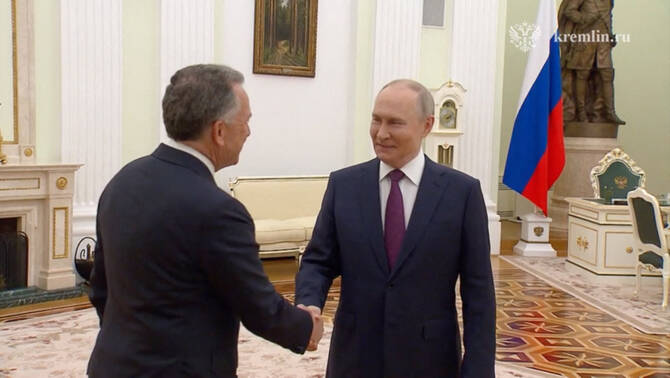ROME: President Donald Trump said Saturday that he doubts Russia’s Vladimir Putin wants to end his war in Ukraine, expressing new skepticism that a peace deal can be reached soon. Only a day earlier, Trump had said Ukraine and Russia were ” very close to a deal.”
“There was no reason for Putin to be shooting missiles into civilian areas, cities and towns, over the last few days,” Trump said in a social media post as he flew back to the United States after attending Pope Francis’ funeral at the Vatican, where he met briefly with Ukrainian President Volodymyr Zelensky.
Trump also hinted at further sanctions against Russia.
“It makes me think that maybe he doesn’t want to stop the war, he’s just tapping me along, and has to be dealt with differently, through “Banking” or “Secondary Sanctions?” Too many people are dying!!!” Trump wrote.
The new doubts aired by Trump come as the president and top aides intensify their push to come to a deal to end the war that began in February 2022 when Russian invaded Ukraine.
The comments also sharply contrasted with Trump’s positive assessment that the two sides were “very close to a deal” after his special envoy, Steve Witkoff, had met with Putin in Moscow on Friday.
The Trump-Zelensky conversation on the sidelines of the pope’s funeral was first face-to-face encounter between the two leaders since they argued during a heated Oval Office meeting at the White House in late February. That confrontation led to the White House to briefly pause US military assistance and intelligence sharing with Ukraine.
Days after ordering the pause, Trump also announced he was “strongly considering” imposing new sanctions and tariffs on Russia to try to prod Putin to negotiate in earnest. Trump has not yet followed through on the threat — something even some of his staunch Republican allies are now pressuring him to do.
It’s the second time a matter of days that Trump has rebuked Putin, whom the American president rarely publicly criticizes.
On Thursday, Trump publicly urged the Russian leader to “STOP!” after a deadly barrage of attacks on Kyiv, Ukraine’s capital.
After their brief meeting Saturday, Zelensky’s office had said the US and Ukrainian teams were making arrangements for the leaders to talk again Saturday. But Trump went directly to the Rome airport after the funeral and boarded Air Force One for the 10-hour flight back to the United States.
Zelensky’s spokesperson, Serhii Nykyforov, said Trump and Zelensky did not meet again in person because of their tight schedules.
Zelensky called it a “good meeting” on social media after the funeral.
“We discussed a lot one on one. Hoping for results on everything we covered. Protecting lives of our people. Full and unconditional ceasefire. Reliable and lasting peace that will prevent another war from breaking out,” he said on X. “Very symbolic meeting that has potential to become historic, if we achieve joint results. Thank you.”
The White House called the discussion “very productive” and said it would release more details later. The meeting lasted about 15 minutes inside St. Peter’s Basilica at the Vatican, where Francis often preached the need for a peaceful end to the war, just before Trump and Zelensky took their seats at the outdoor funeral service.
The Vatican long ago had offered to help facilitate peace talks and Francis had regularly called for peace and dialogue from the altar of the basilica. That Trump and Zelensky spoke privately, face to face and hunched over on chairs on the marbled floors of the pope’s home, on the day of his funeral, was perhaps a fitting way to honor his wishes.
Trump said on social media, after he arrived in Italy late Friday, that Russia and Ukraine should meet for “very high level talks” on ending the war.
Neither Putin nor Zelensky have commented Trump’s calls for direct talks.
Trump has pressed both sides to quickly come to an agreement to end the war, but while Zelensky agreed to an American plan for an initial 30-day halt to hostilities, Russia has not signed on and has continued to strike at targets inside Ukraine.
Putin did not attend Francis’ funeral. He faces an arrest warrant issued by the International Criminal Court, which has accused him of war crimes stemming from Moscow’s invasion of Ukraine.
Meanwhile, in a statement Friday night, Zelensky said “very significant meetings may take place” in the coming days, and that an unconditional ceasefire was needed.
“Real pressure on Russia is needed so that they accept either the American proposal to cease fire and move toward peace, or our proposal — whichever one can truly work and ensure a reliable, immediate, and unconditional ceasefire, and then — a dignified peace and security guarantees,” he said.
“Diplomacy must succeed. And we are doing everything to make diplomacy truly meaningful and finally effective.”
The meeting Saturday also came shortly after Trump had issued his most definitive statement to date about the need for Ukraine to give up territory to Russia to bring the war to a close. He said in a Time magazine interview published Friday that “Crimea will stay with Russia.”
Russia seized the strategic peninsula along the Black Sea in southern Ukraine in 2014, years before the full-scale invasion that began in 2022. Zelensky wants to regain Crimea and other Ukrainian territory seized by Russia, but Trump considers that demand to be unrealistic.
Referring to Crimea during the interview, which was conducted at the White House on Tuesday, Trump said, “everybody understands that it’s been with them for a long time,” meaning Russia.




























